With robust digital infrastructure and careful recalibration of bank branches under the Banking Correspondent model, India has surpassed Germany, China and South Africa in terms of various financial inclusion metrics, according to the latest State Bank of India (SBI) report.
Mobile and internet banking transactions per 1,000 adults have increased to 13,615 in 2019 from 183 in 2015. The number of bank branches per 100,000 adults rose to 14.7 in 2020 from 13.6 in 2015, which is higher than Germany, China and South Africa, according to the report.
The Banking Correspondent Model
The model in India has been designed to provide necessary banking services at a low cost to promote financial inclusion in even rural areas and among people with limited access to banking services. Under this model, banking services are provided for a minimum of 4 hours per day and for at least five days a week.
Banking Correspondents functioning as banking outlets has progressively obviated the need to set up brick-and-mortar branches. “Traditionally, Indian banks have favoured expanding their brick-and-mortar branches to reach the unbanked population in remote and unbanked villages. However, it was difficult for the banks to open such branches in each and every village,” the report states.
With the number of ‘Banking Outlets in Villages - BCs’ rising from 34,174 in March 2010 to 12.4 lakh in December 2020, there is an outreach of banking services through branchless banking. The number of mobile and internet banking transactions per 1,000 adults has increased nearly 74 times between 2015 and 2020 with 13,615 transactions in 2020 as compared to 183 transactions in 2015. The number of banking outlets in villages has gone up nearly 17 times within a span of 10 years, between 2010 and 2020.
Growth Under PMJDY
“India has stolen a march in financial inclusion with the initiation of PMJDY (Pradhan Mantri Jan Dhan Yojana) accounts since 2014, enabled by a robust digital infrastructure and also careful recalibration of bank branches and thereby using the BC model judiciously for furthering financial inclusion. Such financial inclusion has also been enabled by use of digital payments as between 2015 and 2020, mobile and internet banking transactions per 1,000 adults have increased to 13,615 in 2019 from 183 in 2015," the report said.
As per the report, there are various collateral benefits of such financial inclusion. Crime rate registered has gone down by 8.3 per cent in 2020 (487.8 per lakh population) versus in 2019. The report also states consumption of alcohol and tobacco products has reduced in states where more PMJDY accounts were opened.
Loopholes To Be Addressed
The report has also pointed out that there are still loopholes under the Banking Correspondent model that need to be addressed. “It is sometimes observed that there is no uniformity among the Banking Correspondents across banks regarding adherence to the above guidelines.”
The report has also suggested a few ways to overcome these issues. “We therefore recommend a rationalisation in interchange fee as there is no level playing field in infrastructure provided by all banks,” says the report.


























